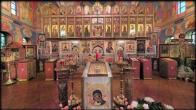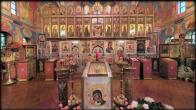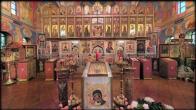You are here
The Great Canon of St. Andrew of Crete
Have mercy upon me, O Lord,
have mercy upon me.
Monday
PDF Format
RTF Format
Tuesday
PDF Format
RTF Format
Wednesday
PDF Format
RTF Format
Thursday
PDF Format
RTF Format
The first week of Great Lent has been known since times of old as the “dawn of abstinence,” or “clean week.” During that week, the Church persuades her children to come out of that sinful state into which all of mankind fell because our forefathers did not abstain, because they lost the blessings of heaven, the state of sin which each of us increases by his personal sins. It coaxes them into coming forth by way of faith, prayer, humility and fasting, things, which are pleasing to God. This is the time for repentance, says the Church “Behold the day of salvation, the entrance to the Fast. O my soul, be watchful, close all the doors through which the passions enter, and look up towards the Lord.” (From the first canticle of the triodion canon at Matins on Monday of the first week of Great Lent).
The Old Testament Church, which held especially sacred the first and last days of several great feasts. Likewise, according to the ustav, Orthodox Christians, prepared and inspired by the maternal instructions offered by their Church from antiquity, observe the first and last weeks of Great Lent especially strictly and assiduously.
The services of the first week are especially lengthy, and the podvig of physical abstinence during that week is considerably more rigorous than in the subsequent days of Great Lent. Over the course of the first four days of Great Lent, Great Compline is served, with the reading of the Great Penitential Canon of St. Andrew of Crete, which as it were sets the tone which is to resound throughout Great Lent. During the first week of Great Lent, the Canon is divided into four separate parts, one chanted at each Compline. On Thursday (actually Wednesday evening) of the fifth week of Great Lent, our attention is again directed to St. Andrew’s marvelous composition, this time in its entirety, so that with the conclusion of Great Lent in sight, we might not become lackadaisical, careless, and negligent, so that we might not forget ourselves and stop strictly watching over ourselves in everything.
The refrain “Have mercy upon me O Lord, have mercy upon me” accompanies each verse of the Great Canon. Several troparia in honor of St. Andrew, composer of the canon, and to St. Mary of Egypt are also included. The Church of Jerusalem implemented this practice during St. Andrew’s lifetime. When in the year 680 AD, St. Andrew traveled to Constantinople for the 6th Ecumenical Council, he brought with him and made public both his great composition and the life of St. Mary of Egypt, written by his compatriot and teacher, Sophronios, Patriarch of Jerusalem. The Life of St. Mary of Egypt is read together with the Great Canon at Matins on Wednesday of the fifth week of Great Lent.
The Great Canon is more astonishing than any other liturgical text encountered during Great Lent. It is a marvel of liturgical hymnography, with texts of amazing power and poetic beauty. The Church decided to call it the Great Canon not so much for its length (250 troparia, or verses), as for the quality and power of its content. St. Andrew, Archbishop of Crete, who composed the Canon in the 7th Century, also composed many other canons used by the Church over the course of the liturgical year.
The Great Canon consists of a conversation between the penitent and his own soul. The conversation begins:
“Where shall I begin to weep for the actions of my wretched life? What first-fruit shall I offer O Christ in this my lamentation? But in Thy compassion grant me forgiveness of sins.” – with what shall I begin to repent, for it is so difficult.
A marvelous troparion follows:
“Come wretched soul, with thy flesh to the Creator of all. Make confession to Him, and abstain henceforth from thy past brutishness; and offer to God tears of repentance.”
The words are astonishing, containing both Christian anthropology and asceticism: our flesh, an inseparable part of human nature and being, must also participate in our repentance.
The apogee of this conversation with the soul, its constant unremitting call to repentance, comes in the kontakion sung following the 6th canticle of the Canon:
“My soul, O my soul, rise up! Why art thou sleeping? The end draws near and soon thou shalt be troubled. Watch, then, that Christ thy God may spare thee, for He is everywhere present and fillest all things.”
The great luminary of the Church addresses these words to himself, to the one who could be described with the words he used to describe St. Mary of Egypt, who truly was an “angel in the flesh.” And yet, he so addressed himself, reproaching himself for his soul being in slumber. If he could see himself as such a one, how should we see ourselves? As immersed not only in spiritual sleep from which we cannot be roused, but also in some kind of necrosis.
When we heed the words of the canon of St. Andrew of Crete, we have to ask ourselves: What must I do? If one were to fulfill God’s Law, as he ought, the contents of his life would be of quite a different composition. It is for this reason that the Church offers us this profound Great Lenten Penitential Canon, so full of feeling and conviction, so that we might look deeper into our souls and see what is there. And yet, the soul continues to sleep; in that is our sorrow and our misfortune.
In the wonderful prayer of St Ephraim the Syrian, which we repeat throughout Great Lent, we hear words to the following effect: “O Lord and King, grant unto me to see my transgressions! I do not see them; my soul has dozed off, has fallen asleep, and I cannot even see those sins, as I ought. How then will I be able to repent of them!” This is precisely why, in the days of Great Lent, each of us should focus all the more on himself/herself, must examine his life, and measure it against the standard set forth in the Gospels, and against no other.
A basic distinguishing feature of the Great Canon is its extremely broad use of images and subjects taken from Sacred Scripture, from both the Old and New Testaments. Unfortunately, we do not know the Holy Bible as well as we ought, and because we do not, for many of us the names mentioned in the Great Canon mean nothing.
And yet, the Bible is not merely a history of the people of Israel. It is also a great chronicle of the soul of mankind, of the souls which would repeatedly fall and stand up again before the face of God, which repeatedly fell into sin and repeatedly repented. If we were to examine the lives of those mentioned in the Bible, we would see that each of them is presented not so much as a historical figure, an individual that did such and such, but as an individual standing before the Living God. The person’s historical or other accomplishments are accorded second place. What remains is what is most important: did that person remain faithful to God, or not. If we read the Bible and the Great Canon with that frame of reference, we will see that much of what is said about the righteous ones and sinners of antiquity is nothing less than a chronicle of our soul, of our repeated falling and rising, of our repeated sin and repentance.
In this regard, a certain religious writer said something quite relevant: “If, in our days so many find it [the Great Canon] boring and not relevant to our lives, it is because their faith is not taking nourishment from the fount of Sacred Scripture, the spring which for the Fathers of the Church was the very source of their faith. We must once again learn to apprehend the world as it is revealed to us in the Bible, learn to live in that biblical world. There is no better way of learning this than through the church service, which not only passes on to us biblical teaching, but also reveals to us the biblical way of life.” (Protopresbyter Alexander Schmemann, Great Lent, p. 97).
And so, through the individuals and events recounted in the Great Canon, the history of the Old Testament and the New Testament passes before us. Its author points out to us our forefathers’ falling into sin, and the corruption of the original world. He points to Noah’s virtues and the bitterness and lack of repentance shown by the people of Sodom and Gomorrah. He resurrects for us the memory of the righteous patriarchs and valiant men: Moses, Joshua son of Nun, Gideon and Jepthah; he allows us to look at the King David’s piety, his fall and touching repentance; he points out to us Ahab’s and Jezebel’s impiety, and also the great paradigms of repentance – the Ninevites, Manasseh, the harlot, and the wise thief. He accords special attention to Mary of Egypt, and more than once stops the reader at the Cross and at the Holy Sepulchre of our Lord. Everywhere, he teaches repentance, humility, prayer, and self-denial. It is in these examples that the exhortation to the soul constantly takes place – [O my soul] remember this righteous one; thus did he please God; remember that righteous one as well; thus did he please God; you have done nothing comparable.
The Bible speaks of some individuals in a positive light, and about others in a negative one. We must emulate the one, and not the other.
“Riding in the chariot of the virtues, Elijah was lifted up to heaven, high above earthly things. Reflect, my soul, upon his ascent.” – Reflect, O my soul, upon the ascent of the righteous ones of the Old Testament.
“O wretched soul, always thou hast imitated the polluted thoughts of Gehazi. Cast from thee, at least in thine old age, his love of money. Flee from the fire of hell, turn away from thy wickedness.” - At least in old age, rid yourself of Gehazi’s avarice, O soul, and leaving behind your evil deeds, avoid the fires of hell.
As we can see, the texts are fairly difficult, and therefore, it is essential to prepare well for the Great Canon, so that we might apprehend it.
In the concluding ode chanted on the first day, after all of the historical recollections, there follow troparia of amazing power:
“The Law is powerless, the Gospel of no effect, and the whole of Scripture is ignored by thee: the prophets and all the words of the righteous are useless. Thy wounds, my soul have been multiplied, and there is no physician to heal thee.” – it is useless to remind you of the Old Testament; everything is useless. I will give you examples from the New Testament, and perhaps you will then repent.
“I bring thee, O my soul, examples from the New Testament to lead thee to compunction. Follow the example of the righteous, turn away from the sinful, and through prayers and fasting, through chastity and reverence, win back Christ’s mercy.”
Finally, having presented all from the Old Testament, the writer ascends toward the Giver of Life, the Savior of our souls, and like the thief, he cries out “Have mercy upon me!” and like the publican exclaims “God be merciful to me a sinner!” Emulating the persistence of the Canaanite woman and the blind man at the crossroads he says “have mercy on me O son of David! Like unto the harlot, he pours out tears instead of myrrh onto Christ’s head and feet, and weeps bitterly over himself as Martha and Mary did over Lazarus.
Farther on, the Canon underscores the fact that the worst of sinners repented, and will enter the Heavenly Kingdom before we do:
“Christ became man, calling to repentance thieves and harlots. Repent, my soul: the door of the Kingdom is already open, and Pharisees and publicans and adulterers pass through it before thee, changing their life.”
And when, in some kind of spiritual horror, following from afar after the miracles of the Savior, and brought to compunction by each spiritual struggle in His earthly life, the author of the Canon reaches the awful sacrifice of Christ, his heart’s strength flags, and together with all Creation, he falls silent on quaking Golgotha, and cries out one last time:
“O my Judge who dost know me, when Thou comest again with the angels to judge the whole world, look upon me then with Thine eye of mercy and spare me; take pity on me Jesus, for I have sinned more than any other man.”
In its concluding troparia, the Great Canon, using every possible means to move us to repentance, as it were reveals to us its “method” [of instruction]: How I have talked with thee, O soul! I have reminded thee of the Old Testament righteous ones, and have given thee examples from the New Testament [to lead thee to compunction], and yet it is has all been for naught, for “thou, my soul hast not followed their lives and actions. Woe to thee when thou art judged!” – woe unto thee, when thou shalt stand before the Judgment!
Attending the words of the Great Canon, having scrutinized the history of people who ran from God only to be overtaken by Him, people who were in chasms, but whom God led out, let us contemplate the fact that God brings each of us out of the chasm of sin and despair, so that we might offer Him the fruits of repentance.
One should not imagine that repentance consists of rooting around in one’s personal sins, engaging in self-flagellation, and striving to expose in oneself as much evil and darkness as possible. To truly repent is to turn from the darkness to the light, from sin to righteousness, to understand that our life has been unworthy of its high calling, to confess before God how insignificant we are, and confess that our only hope is God Himself. True repentance is when, standing before the face of God, Who, as the Apostle Peter says “hath called you out of darkness into His marvelous light,” (I Peter 2: 9), we understand that life was given to us so that we might become children of God, so that we might commune of the Divine Light. True repentance is reflected not so much in words as in deeds: in readiness to come to one the aid of others, to be open with our neighbors, and not become involuted onto oneself. True repentance is understanding that, while we do not possess the power to become true Christians, God is capable of making us so. As it says in the Great Canon “wheresoever God wishes, the order of nature is overcome.” That is to say, where God so wishes, supernatural events occur: Saul becomes Paul, Jonah is brought out of the belly of the whale, Moses crosses the sea on dry land, the dead Lazarus is resurrected, Mary of Egypt is turned from a harlot into a great righteous one. For, according to the Savior “with men this is impossible, but with God all things are possible.” (Мatt. 19: 26).
Archpriest Victor Potapov
Prayer by St. Ephraim of Syria
O Lord and Master of my life, cast from me the spirit of sloth, despondency, lust for power and idle talk. (Prostration)
But grant unto me, Thy servant, a spirit of chastity, humility, patience and love. (Prostration)
Yea, O Lord and King, grant me to see my own faults and not to judge my brothers and sisters. For Thou art blessed unto ages of ages. Amen. (Prostration)
O God, cleanse Thou me a sinner (12 times, with as many bows, and then again the whole prayer from the beginning throughout, and after that one great prostration)
PARISH LIFE
RECENT VIDEOS
Address of our Cathedral
Subscribe to our mailing list
While all the materials on this site are copyrighted, you may use them freely as long as you treat them
with respect and provide attribution on the Russian Orthodox Cathedral of St.John the Baptist of Washington DC.









